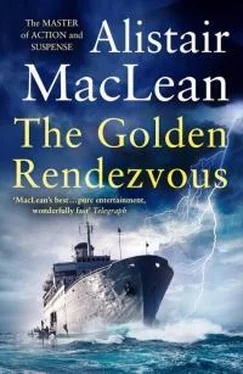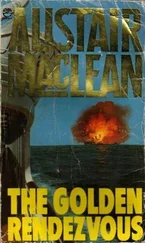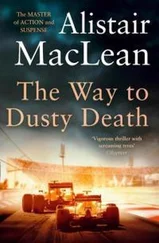Pitching. The Campari was pitching, but with a now even more exaggerated cork-screw motion, great sheets of flying water breaking over the bows and being hurled back against the superstructure. At some hundreds of miles from the centre of a hurricane – and I didn’t need any barometers or weather forecasts to tell me what was in the offing – it is the outspreading swell that indicates the direction of the centre: but closer in, and we were getting far too close for comfort, it is the wind direction that locates the centre. We were heading roughly 20 degrees east of north, and the wind blowing from dead ahead. That meant the hurricane was roughly to the east of us, with a little southing, still keeping pace with us, travelling roughly north-west, a more northerly course than was usual: and the Campari and the hurricane were on more of a collision course than ever. The strength of the wind I estimated at force eight or nine on the old Beaufort scale: that made the centre of the storm less than a hundred miles away. If Carreras kept on his present course at his present speed, everybody’s troubles, his as well as ours, would soon be over.
At the top of the second companion way I stood still for a few moments to steady myself, took Susan’s arm for support, then lurched aft in the direction of the drawing-room, twenty feet away. I’d hardly starting lurching when I stopped. Something was wrong.
Even in my fuzzy state it didn’t take long to find out what was wrong. On a normal night at sea, the Campari was like an illuminating Christmas tree: tonight, every deck light was off. Another example of Carreras taking no chances, although this was an unnecessary and exaggerated example. Sure he didn’t want anyone to see him, but in a black gale like this no one would have seen him anyway, even had any vessel been heading on the same course, which was hardly possible unless its master had taken leave of his senses. But it suited me well enough. We staggered on, making no attempt to be silent. With the shriek of the wind, the thunderous drumming of the torrential rain and the repeated pistol-shot explosions as the rearing Campari ’s bows kept smashing into the heavy rolling combers ahead no-one could have heard us a couple of feet away.
The smashed windows of the drawing-room had been roughly boarded up. Careful not to cut a jugular or put an eye out on one of the jagged splinters of glass, I pressed my face close to the boards and peered through one of the cracks.
The curtains were drawn inside, but with the gale whistling through the gaps between the boards they were blowing and flapping wildly almost all the time. One minute there and I’d seen all I wanted to see and it didn’t help me at all. The passengers were all hearded together at one end of the room, most of them huddled down on close-packed mattresses, a few sitting with their backs to the bulkhead. A more miserably sea-sick collection of millionaires I had never seen in my life: their complexions ranged from a faintly greenish shade to a dead white pallor. They were suffering all right. In the corner I saw some stewards, cooks and engineer officers, including McIlroy, with Cummings beside him: seaman’s branch apart, it looked as if every off-duty man was imprisoned there with the passengers. Carreras was economising on his guards: I could see only two of them, hard-faced, unshaven characters with a tommy-gun apiece. For a moment I had the idea of bursting in the door and rushing them: but only for a moment. Armed with only a clasp-knife and with a top speed of about that of a fairly active tortoise, I wouldn’t have got a yard.
Two minutes later we were outside the wireless office. No one had challenged us, no one had seen us, the decks were entirely deserted. It was a night for deserted decks.
The wireless office was in darkness. I pressed one ear to the metal of the door, closed a hand over the other ear to shut out the clamour of the storm and listened as hard as I could. Nothing. I placed a gentle hand on the knob, turned and pushed. The door didn’t budge a fraction of an inch. I eased my hand off that door-knob with all the wary caution and thistledown delicacy of a man withdrawing the Koh-i-noor from a basket of sleeping cobras.
“What’s the matter?” Susan asked. “Is–”
That was as far as she got before my hand closed over her mouth, not gently. We were fifteen feet away from that door before I took my hand away.
“What is it? What is it?” Her low whisper had a shake in it, she didn’t know whether to be scared or angry or both.
“The door was locked.”
“Why shouldn’t it be? Why should they keep watch–”
“That door is locked by a padlock. From the outside. We put a new one on there yesterday morning. It’s no longer there. Somebody has shut the catch on the inside.” I didn’t know how much of this she was getting: the roar of the sea, the drumfire of the rain, the wind rushing in from the darkness of the north and playing its high-pitched threnody in the rigging seemed to drown out and snatch away the words even as I spoke them. I pulled her into what pitiful shelter was offered by a ventilator and her next words showed that she had indeed heard and understood most of what I had said.
“They have left a sentry? Just in case anyone tried to break in? How could anyone break in? We’re all under guard and lock and key.”
“It’s as Carreras Junior says – his old man never takes a chance.” I hesitated, then, because I didn’t know what else to say. I went on: “I’ve no right to do this. But I must. I’m desperate. I want you to be a stalking horse – help get that character out of there.”
“What do you want me to do?”
“Good girl.” I squeezed her arm. “Knock at the door. Pull that hood off and show yourself at the window. He’ll almost certainly switch on a light or flash a torch, and when he sees it’s a girl – well, he’ll be astonished, but not scared. He’ll want to investigate.”
“And then you – you–”
“That’s it.”
“With only a clasp-knife.” The tremor in the voice was unmistakable. “You’re very sure of yourself.”
“I’m not sure at all. But if we don’t make a move until we’re certain of success we might as well jump over the side now. Ready?”
“What are you going to do? Once you get inside?” She was scared, and stalling. Not that I was happy myself.
“Send an SOS on the distress frequency. Warn every vessel within listening range that the Campari has been seized by force and is intending to intercept a bullion-carrying vessel at such and such a spot. Within a few hours everyone in North America will know the situation. That’ll get action all right.”
“Yes.” A long pause. “That’ll get action. The first action it will get is that Carreras will discover that his guard is missing – and where had you thought of hiding him?”
“In the Atlantic.”
She shivered briefly, then said obliquely: “I think perhaps Carreras knows you better than I do … The guard’s missing. They’ll know it must be one of the crew responsible. They’ll soon find out that the only guard keeping an eye on the crew who wasn’t awake all the time is the boy outside the sick-bay.” She was silent for a moment, then went on so softly that I could hardly hear her above the storm: “I can just see Carreras ripping those bandages off your leg and finding out that your thigh is not broken. You know what will happen then?”
“It doesn’t matter.”
“It matters to me.” She said the words calmly, matter-of-factly, as if they were of no particular significance. “Another thing. You said everybody would know the set-up within a few hours. The two radio operators Carreras has planted on the Ticonderoga will know immediately. They will immediately radio the news back to the Campari , to Carreras.”
Читать дальше
Конец ознакомительного отрывка
Купить книгу












